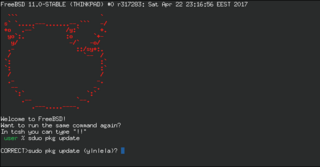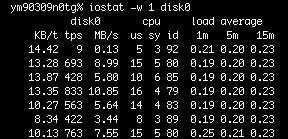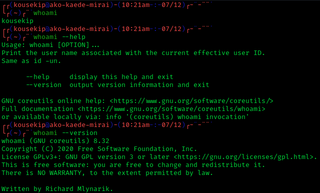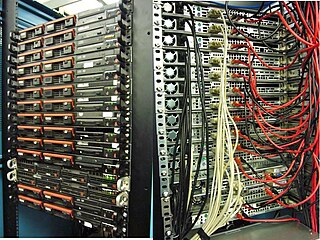In computing, traceroute and tracert are computer network diagnostic commands for displaying possible routes (paths) and measuring transit delays of packets across an Internet Protocol (IP) network. The history of the route is recorded as the round-trip times of the packets received from each successive host in the route (path); the sum of the mean times in each hop is a measure of the total time spent to establish the connection. Traceroute proceeds unless all sent packets are lost more than twice; then the connection is lost and the route cannot be evaluated. Ping, on the other hand, only computes the final round-trip times from the destination point.

A man page is a form of software documentation usually found on a Unix or Unix-like operating system. Topics covered include computer programs, formal standards and conventions, and even abstract concepts. A user may invoke a man page by issuing the man command.

tcsh is a Unix shell based on and backward compatible with the C shell (csh).

In computing, ls is a command to list computer files and directories in Unix and Unix-like operating systems. It is specified by POSIX and the Single UNIX Specification.
Uptime is a measure of system reliability, expressed as the percentage of time a machine, typically a computer, has been working and available. Uptime is the opposite of downtime.

fdisk is a command-line utility for disk partitioning. It has been part of DOS, DR FlexOS, IBM OS/2, and early versions of Microsoft Windows, as well as certain ports of FreeBSD, NetBSD, OpenBSD, DragonFly BSD and macOS for compatibility reasons. Windows 2000 and its successors have replaced fdisk with a more advanced tool called diskpart.
cURL is a computer software project providing a library (libcurl) and command-line tool (curl) for transferring data using various network protocols. The name stands for "Client for URL".

In computing, netstat is a command-line network utility that displays network connections for Transmission Control Protocol, routing tables, and a number of network interface and network protocol statistics. It is available on Unix, Plan 9, Inferno, and Unix-like operating systems including macOS, Linux, Solaris and BSD. It is also available on IBM OS/2 and on Microsoft Windows NT-based operating systems including Windows XP, Windows Vista, Windows 7, Windows 8 and Windows 10.
The following tables compare general and technical information between a number of notable IRC client programs which have been discussed in independent, reliable prior published sources.

iostat is a computer system monitor tool used to collect and show operating system storage input and output statistics. It is often used to identify performance issues with storage devices, including local disks, or remote disks accessed over network file systems such as NFS. It can also be used to provide information about terminal (TTY) input and output, and also includes some basic CPU information.

In computing, whoami is a command found on most Unix-like operating systems, Intel iRMX 86, every Microsoft Windows operating system since Windows Server 2003, and on ReactOS. It is a concatenation of the words "Who am I?" and prints the effective username of the current user when invoked.
A system monitor is a hardware or software component used to monitor system resources and performance in a computer system.
chattr is the command in Linux that allows a user to set certain attributes of a file. lsattr is the command that displays the attributes of a file.
Toybox is a free and open-source software implementation of over 200 Unix command line utilities such as ls, cp, and mv. The Toybox project was started in 2006, and became a 0BSD licensed BusyBox alternative. Toybox is used for most of Android's command line tools in all currently supported Android versions, and is also used to build Android on Linux and macOS. All of the tools are tested on Linux, and many of them also work on BSD and macOS.

System Activity Report (sar) is a Unix System V-derived system monitor command used to report on various system loads, including CPU activity, memory/paging, interrupts, device load, network and swap space utilization. Sar uses /proc filesystem for gathering information.

Unix is a family of multitasking, multi-user computer operating systems that derive from the original AT&T Unix, whose development started in 1969 at the Bell Labs research center by Ken Thompson, Dennis Ritchie, and others.

OpenSSH is a suite of secure networking utilities based on the Secure Shell (SSH) protocol, which provides a secure channel over an unsecured network in a client–server architecture.

Super Dimension Fortress is a non-profit public access UNIX shell provider on the Internet. It has been in continual operation since 1987 as a non-profit social club. The name is derived from the Japanese anime series Super Dimension Fortress Macross; the original SDF server was a Bulletin board system created by Ted Uhlemann for fellow Japanese anime fans. From its BBS roots, which have been well documented as part of the BBS: The Documentary project, SDF has grown into a feature-rich provider serving members around the world.
systat is a BSD UNIX console application for displaying system statistics in fullscreen mode using ncurses/curses. It is available on, and by default ships in the base systems of, FreeBSD, NetBSD, OpenBSD and DragonFly BSD. It was first released as part of 4.3BSD in 1986.

The Sniffer was a computer network packet and protocol analyzer developed and first sold in 1986 by Network General Corporation of Mountain View, CA. By 1994 the Sniffer had become the market leader in high-end protocol analyzers. According to SEC 10-K filings and corporate annual reports, between 1986 and March 1997 about $933M worth of Sniffers and related products and services had been sold as tools for network managers and developers.










